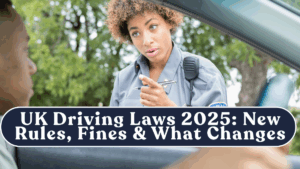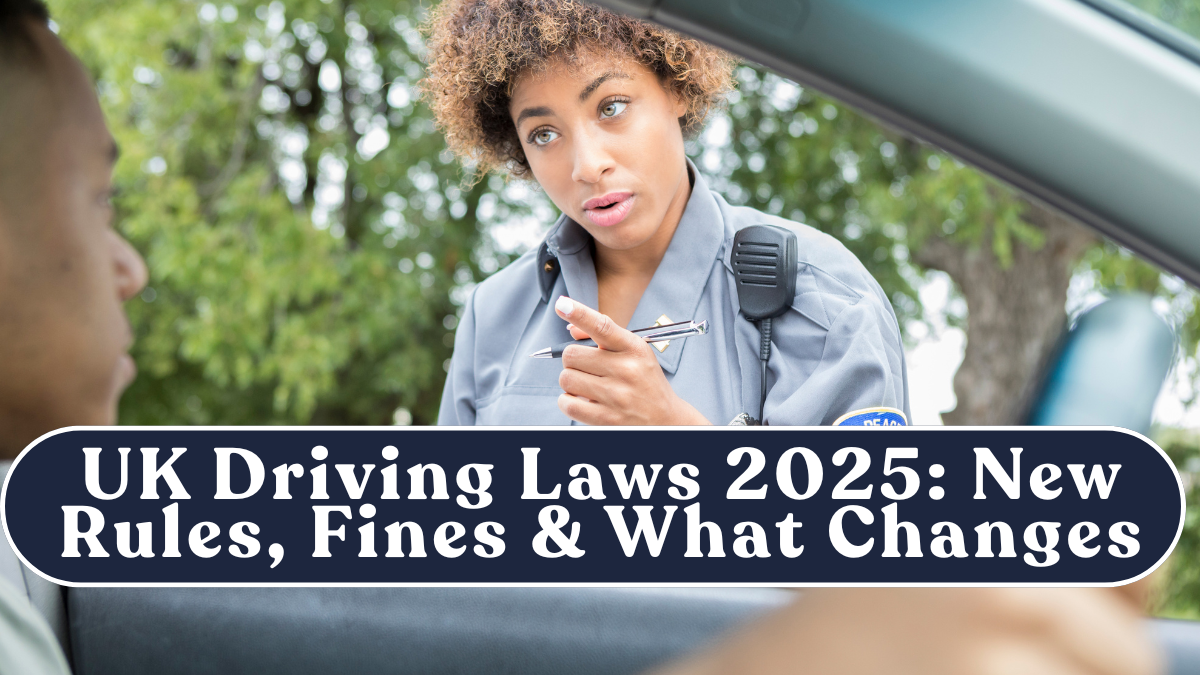From October 2025, several major changes to UK driving laws will come into effect, reshaping how motorists navigate roads, parking regulations, and vehicle ownership responsibilities. The updates are part of the government’s ongoing effort to modernize road safety standards, encourage sustainable transport, and curb unsafe driving practices.
Whether you drive daily or occasionally, understanding these updates is crucial — as several of the new rules involve stricter penalties, expanded enforcement zones, and digital enforcement technologies that leave little room for error.
This comprehensive guide breaks down what’s changing, who it affects, and how to stay compliant with the latest UK motoring regulations.

Overview: What’s Changing from October 2025
The Department for Transport (DfT), in collaboration with local councils and the DVLA, has introduced a series of measures that target four key areas:
-
Speeding and road safety enforcement
-
ULEZ and Clean Air Zone expansion
-
Mobile phone and in-car tech usage
-
Digital licensing and parking reforms
These changes aim to reduce fatalities, improve air quality, and ensure responsible vehicle operation across the UK.
1. Stricter Speeding Rules and Digital Cameras
One of the most notable changes under the Road Traffic Offences (Modernization) Act 2025 is the wider use of AI-enabled smart speed cameras. These devices can now detect multiple violations simultaneously — such as speeding, mobile use, and seatbelt non-compliance.
New enforcement features include:
-
Automatic detection of handheld phone usage and seatbelt violations.
-
Variable speed limits on smart motorways adjusted dynamically by traffic flow.
-
Immediate digital issuance of fines through DVLA-linked systems.
Penalty update (effective Oct 2025):
-
Speeding fines can reach £2,000 for repeat offenders.
-
Instant license suspension for drivers caught exceeding limits by 40% or more.
The new system ensures near real-time penalty notifications, minimizing delays and appeals.
2. Mobile Phone and Dashboard Device Ban
The government has expanded the mobile device ban to include hands-free dashboard mounts if the driver interacts with the device while in motion.
Key inclusions:
-
Using a mobile for navigation or voice notes without a full hands-free setup is illegal.
-
Smartwatch use for calls or notifications while driving is prohibited.
-
Dash-mounted cameras must not obstruct visibility beyond legal limits.
Fines and penalties:
-
£200 fine and 6 penalty points for the first offence.
-
Repeat offences can lead to a 12-month driving ban.
This reform aims to combat distraction-related accidents, which accounted for more than 20% of UK road incidents in 2024.
3. Expansion of Clean Air and ULEZ Zones
The Ultra Low Emission Zone (ULEZ) and Clean Air Zone (CAZ) programs will expand to additional cities starting October 2025, including Manchester, Leeds, Bristol, and Newcastle.
Important updates:
-
Diesel vehicles registered before Euro 6 (2015) will incur daily charges.
-
Petrol cars older than Euro 4 (2006) remain non-compliant.
-
Zero-emission vehicles (EVs) and plug-in hybrids remain exempt.
ULEZ daily charges:
-
Non-compliant petrol/diesel cars: £12.50 per day
-
Non-compliant vans or minibuses: £20 per day
-
Heavy goods vehicles (HGVs): £100 per day
Local councils will expand enforcement through ANPR (Automatic Number Plate Recognition) cameras to identify violations.
4. Digital Driving Licences and Online Penalties
From October 2025, the DVLA will roll out digital driving licences across England, Scotland, and Wales. The mobile-based version will function as a legally valid replacement for physical cards.
Key features:
-
Digital licence stored in the UK Verify App (secure identity platform).
-
Real-time updates for points, insurance status, and MOT records.
-
QR-based vehicle verification for police and rental agencies.
Paper counterpart licences will be phased out by mid-2026, though physical cards will remain optional for older motorists.
In parallel, digital penalty notices will replace most postal fines, making the entire enforcement process faster and more transparent.
5. Revised Parking and Idling Rules
Local councils have been granted greater authority to enforce parking and idling violations through camera-based systems.
Changes include:
-
£120 fines for vehicle idling in school or hospital zones.
-
Automatic ticketing for overstaying in public car parks via ANPR systems.
-
Mandatory disabled parking data digitization to prevent fraudulent Blue Badge use.
Electric vehicle (EV) bays will also carry exclusive usage fines for non-EV vehicles, with penalties starting at £70.
6. Insurance and MOT Updates
The 2025 reforms also streamline insurance verification and MOT testing:
-
Drivers must maintain real-time insurance record syncing with the Motor Insurance Database (MID).
-
Vehicles registered before 2010 must pass stricter emission compliance checks during MOT.
-
EV battery health reporting becomes part of annual MOT certification.
Failure to comply can result in MOT failure or insurance invalidation.
Expected Impact and Compliance Tips
These reforms collectively push the UK toward safer, greener, and more transparent road management. Drivers are advised to:
-
Switch to ULEZ-compliant vehicles or EVs where possible.
-
Avoid phone use entirely while driving — even with mounts.
-
Regularly update insurance and MOT details online.
-
Register for digital licence verification to simplify renewals.
Failure to comply with multiple infractions could result in license suspension or vehicle seizure under the updated penalty code.
Why the October 2025 Changes Matter
The UK’s motoring framework is undergoing its most significant update in a decade. These changes are designed to:
-
Reduce road accidents caused by distractions.
-
Cut emissions and improve urban air quality.
-
Digitize records for efficiency and transparency.
-
Encourage the transition toward eco-friendly vehicles.
For drivers, the next few months are crucial to adapt — especially for those in urban zones or reliant on older vehicles.
FAQs
When do the new UK driving laws come into effect?
All new regulations take effect from 1 October 2025, with phased enforcement over the following months.
Can I still use hands-free devices?
Yes, but only if your device is fully hands-free and does not require physical interaction while driving.
What are the new speeding penalties?
Fines can reach up to £2,000 for repeat offenders, with instant licence suspension for severe violations.
Will my old car be affected by new ULEZ zones?
Yes. Older petrol and diesel cars that don’t meet emission standards will incur daily charges in expanded ULEZ and CAZ zones.
How can I get a digital driving licence?
You can register for the digital licence via the UK Verify App once the rollout begins in October 2025.
Are digital fines legally valid?
Yes. Digital penalty notices issued via DVLA systems are fully valid and enforceable in the UK.
Do these rules apply across the UK?
Most rules apply to England, Scotland, and Wales, though Northern Ireland may adopt them in 2026.
Click here to know more.
